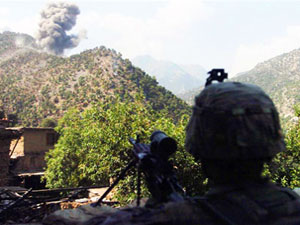Security Council talks peace, but costly war rages in Afghanistan
By Saeed Shabazz -Staff Writer- | Last updated: Jul 9, 2010 - 2:19:42 PMWhat's your opinion on this article?

|

U.S. soldier during combat in Afghanistan. Photo Courtesy, DoD
|
“During our contacts we reiterated the United Nations Security Council's support and enduring commitment to the people of Afghanistan and its government in furthering peace and development and stability,” said Ambassador Ertugrul Apakan of Turkey, during the June 30 Security Council meeting.
The delegation encouraged Afghan authorities to further efforts to uphold the rule of law and human rights, in particular the rights of women and children, he said.
While the UN spoke of sustaining peace in Afghanistan, the American general chosen by President Barack Obama to lead his Afghan war campaign was telling the Senate Armed Services Committee that U.S. forces would remain in Afghanistan for the foreseeable future. Some analysts say the U.S., along with NATO allies, intends to install democracy in Afghanistan at the point of a gun. While President Obama showed decisiveness in showing insubordinate Gen. Stanley McChrystal the door, Americans are still left with a war that has become a disaster, which cannot be won, said critics. The U.S., one of the veto wielding members of the Security Council, is also the strongest proponent of continued war making.
Steffan De Mistura, special representative for UN Secretary-General Ban Ki-Moon to the UN Assistance Mission in Afghanistan, told the Security Council “Afghan and international stakeholders acknowledged that no military solution could bring about stability.”
Britain's UN ambassador, Mark Lyall Grant agreed with the assessment, saying, “The international community could not succeed by only pursuing a military strategy.” The British ambassador expressed support for emergence of an Afghan-led political process.
The UN political mission UNAMA, under Secretary-General Ban's instructions, has been reconfigured and includes supporting September parliamentary elections, fostering reconciliation and encouraging regional cooperation, according to Mr. De Mistura. UNAMA is the largest UN political mission with a budget of $241 million, 700 international staff members and 6,000 national staff members.
Meanwhile experts from the Council on Foreign Relations, the Massachusetts Institute of Technology and the U.S. Institute of Peace jointly issued a position paper telling the Obama administration, “It is a mistake to assume that Afghanistan is ungovernable.” They argued Mr. Obama must identify and share his vision of what an Afghanistan free of war would look like. “Without clear limits the U.S. and NATO military campaign will be rudderless,” the experts said.
But with military spending in Afghanistan and Iraq exceeding a trillion dollars, critics said it's time to end the war and the troops and the money home. “I just returned from Detroit, where I attended the U.S. Social Forum conference, and it looks like the city is ready for the bulldozer. The Obama administration is spending money to build up bases in Kabul and Kandahar in Afghanistan, while our cities continue to suffer,” said Sarah Flounders of the International Action Center.
“The replacing of McChrystal with Gen. (David) Petraeus is about the Pentagon taking off all restraints—stepping up the war—causing a greater level of civilian deaths. While they are refusing to admit that they are completely losing the war, our jobless numbers are rising, schools are closing; and conditions here in the U.S. are getting much, much worse,” she said.
The Washington Post reported that states face “a combined deficit of $89 billion” for the fiscal year that began July 1. The Post, citing information provided by the National Conference of State Legislatures, noted the only recourse is the laying off of 900,000 public sector employees and cutting education budgets, medical services, programs for the disabled and elderly and police and fire service.
“It is an unfortunate thing to say, but the war in Afghanistan is really dragging the nation down,” said Lawrence Hamm, chairman of the Newark-based Peoples Organization for Progress. “How can the Obama administration continue to spend a trillion dollars on war, while our nation's infrastructure continues to crumble?”
Mr. Hamm said the budget situation in New Jersey was at a crucial point with no light or solution at the end of the tunnel.
“It is the war finally coming home to haunt us,” said Ms. Flounders.
Related news:
Afghan mineral wealth story raises eyebrows over timing (FCN, 07-01-2010)
Is Oil The Motive For War (FCN, Minister Farrakhan, 02-17-2002)
Afghanistan, the Taliban and the United States (Media Monitors Network, 05-02-2001)
FinalCall.com Exclusive Interview with Taliban Ambassador (FCN, 01-09-2001)
Taliban in Texas for talks on gas pipeline (BBC News, 12-04-1997)
INSIDE STORIES AND REVIEWS
-
-
About Harriett ... and the Negro Hollywood Road Show
By Rabiah Muhammad, Guest Columnist » Full Story -
Skepticism greets Jay-Z, NFL talk of inspiring change
By Bryan 18X Crawford and Richard B. Muhammad The Final Call Newspaper @TheFinalCall » Full Story -
The painful problem of Black girls and suicide
By Charlene Muhammad -National Correspondent- » Full Story -
Exploitation of Innocence - Report: Perceptions, policies hurting Black girls
By Charlene Muhammad -National Correspondent- » Full Story -
Big Ballin: Big ideas fuel a father’s Big Baller Brand and brash business sense
By Bryan Crawford -Contributing Writer- » Full Story






 Click Here Stay Connected!
Click Here Stay Connected!








